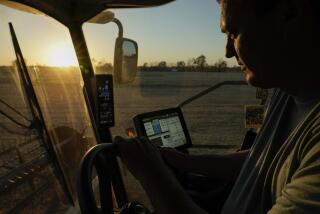Life in Colorful Kentucky Towns : It’s All in the Name: Monkey’s Eyebrow to Rabbit Hash
- Share via
QUICKSAND, Ky. — Busiest time of the day in this Breathitt County hamlet in the hills of Eastern Kentucky is 7:30 a.m. That’s when Quicksanders gather around the pot-bellied stove in the old post office lobby.
They sit on chairs from the long-gone, one-room Quicksand school and on weathered benches to wait for Postmaster Rosa Lea Davis, 61, to sort the mail.
Mail arrives early in this holler at the west end of the long, narrow, one-way bridge crossing the Kentucky River.
Quicksand has about 100 people, and while many of them wait for the mail to be sorted, they exchange the latest gossip.
There isn’t any quicksand in Quicksand, so far as anybody knows, but according to local legend the town got its name after a 19th-Century tragedy.
“It happened before there was a bridge. Folks rode horses across the river to and from the settlement,” Davis said.
“One day a man was returning on his horse and as the horse neared the center of the river the horse began to sink. The man cried out for help. People ran to the river bank, but before they could get to him the man and horse sank from sight, never to be seen again.”
The hills and hollers of Kentucky are sprinkled with hundreds of tiny communities, many with quaint names. Colorful tales describe the derivation of such names as these: Shoulderblade, Sassafras, Dog Walk, Black Gnat, Hell for Certain, Kingdom Come, Moon, Falls of Rough, Preachersville, Mummie, Bright Shade, Summer Shade, Rabbit Hash, Rowdy, Subtle, Skylight, Troublesome and Gravel Switch. There is an Add in Kentucky but no Subtract.
There are hamlets named after early-day residents, like Charley, Phil, Idamay and Mazie. Towns with just numbers for names like Seventy Six and Eighty Eight. One town is called Thousand Sticks.
At Happy, Ky., population 200, Margaret Stroul, 91, lives in and is caretaker of the Happy Bible Church. There’s a Happy Store in town, a Happy Post Office and the R. W. Combs school where all the students are happy kids.
In Goodluck, farmer Edgar Ford, 79, and his wife, Gertie, 73, were visiting farmer Fim L. Fudge, 77, and his wife, Florence, on the Fudges’ back porch.
“Everybody in Goodluck generally have good luck?” Fim Fudge was asked by a stranger who happened by.
“Some does. Some don’t,” Fudge replied. “But I reckon there’s more good luck in Goodluck than bad luck. Look at the four of us sittin’ here. We’re in our 70s and we’re still breathin’. Now that’s good luck, wouldn’t you say?”
At Lovely, population 1,500, a coal-mining town, Shelba Brown, 44, is the Lovely postmaster at the only Lovely Post Office in the United States. She lives in Beauty, Ky., population 800, four miles down the road from Lovely.
Wayne Copley of Lovely wrote a song about his hometown, “I’m a Lovely Kentuckian.” Somebody is missing a good bet. There isn’t a Lovely beauty shop in Lovely or a Beauty beauty shop in Beauty.
Opal Brown, 78, has lived in Ordinary, population 50, all her life. She was an Ordinary teacher at the one-room Ordinary School, which no longer exists.
“We’re really not ordinary in Ordinary. We’re all very special,” she said with a laugh.
Up the road from Ordinary is Newfoundland, which you would expect to be pronounced the same as the province in Canada. No way. Not in Kentucky. Here it’s called “New-fell-in.”
“We have more fun with the name of our little community,” said Ruth Ashford, 71, lifelong resident of Monkey’s Eyebrow, on the Ohio River in Western Kentucky. People in Paducah have a saying that their small city is located half way between Monkey’s Eyebrow and Possom Trot.
Kentuckians know Monkey’s Eyebrow for great goose hunting in winter. Said Ashford: “It always breaks people up when I am somewhere else and am asked where I’m from. No one knows for sure why this place is called Monkey’s Eyebrow. There’s plenty of wildlife in these parts--deer, coyotes, wolves, muskrat and mink--but no monkeys.”
The town next to Monkey’s Eyebrow is Bandana, Ky., population 100. It got its name, so the story goes, because in the old days “the good ol’ boys down there wore bandanas.”
In the general store at Viper, population 200, storekeepers Don Carter, 60, and his son, Don II, 18, reckoned the town was aptly named.
“This place is alive with snakes,” the father said, “rattlesnakes, copperheads, venomous black snakes with heads that swell up when they’re about to strike. You got to watch out where you step. My neighbor opened his front door the other day and there was a six-foot rattler on his porch.”
There is a Viper Elementary School, Viper Fire Department, Viper Post Office, Viper Railroad Depot and a lot of vipers in Viper.
In Turkey, population about 100, Leonard Terry, 85, who can still jump over a four-strand stretched barbed-wire fence with his old mule, remembers when overalls “with zips” (zippers) were introduced in the country store in his hometown in the early ‘30s and prices shot up from $1.25 to $1.35 a pair. Turkey was named for wild turkeys in the area.
Moon pies are popular items in country stores throughout Kentucky. It’s a marshmallow sandwich that comes in three flavors: banana, vanilla and chocolate.
“You can’t run a grocery without moon pies,” said Cassi Jackson, 73, owner-operator of a tiny store in Little Laurel, population 50. She said customers of all ages come in every day ordering RC Cola and a moon pie.
“When I first opened the store in 1942, I stocked it with $65 worth of supplies. Moon pies were the first things I ordered.”
Bourbon gets its name from Bourbon County, Ky., where one of the first distillers to introduce it is reported to have been a preacher named Elija Craig.
America’s two Civil War Presidents were born in tiny Kentucky towns 90 miles apart, Abraham Lincoln at Hodgenville, and Jefferson Davis, president of the Confederacy, at Fairview.
The log cabin in which Lincoln was born is a National Historic Site. A 351-foot-high concrete obelisk, erected by the Daughters of the Confederacy and dedicated in 1924, marks Davis’ birthplace. It is a state park.
All summer at Harrodsburg, Kentucky’s oldest town, two outdoor dramas about Kentuckians, “The Legend of Daniel Boone” and “Lincoln,” are performed on alternate nights by the same actors.
This summer, Martha Wehmeier of Eugene, Ore., was Lincoln’s wife one night, and Daniel Boone’s wife the next. Kevin Lanham, a farmer from Gravel Switch, Ky., portrays Lincoln. He doesn’t act in the Daniel Boone play. Jim Gall of Independence, Mo., plays Daniel Boone one night and Jack Armstrong, one of Lincoln’s best friends, the following night.
From Abigail to Zula, in hamlets from one end of the state to the other, it seems as if all of Kentucky is having one big rummage sale this summer.
Draped over fences and spread out on lawns are no-longer-wanted shirts, skirts, sweaters, dresses and trousers for sale. There are front-porch sales, sidewalk sales, church sales and yard sales.
In Bighill, population 150, at the Narrow Way Church of God (also known as the One Way Jesus Church), Pastor John Gross’ 400 members donated old clothes, books, phonograph records, tapes, toys, shoes and socks to the rummage sale.
“We’re selling everything for a nickel, dime or quarter,” parishioner Wayne Pruitt said. “We have made $170 in four days. This is the best year ever.”
A sign next to the church announced: “Gospel singing, bring a chair.”
Things are not ordinary in Ordinary; monkeys don’t live in Monkey’s Eyebrow, and life is far from dull in the hills and hollers of old Kentucky.
More to Read
Sign up for The Wild
We’ll help you find the best places to hike, bike and run, as well as the perfect silent spots for meditation and yoga.
You may occasionally receive promotional content from the Los Angeles Times.






